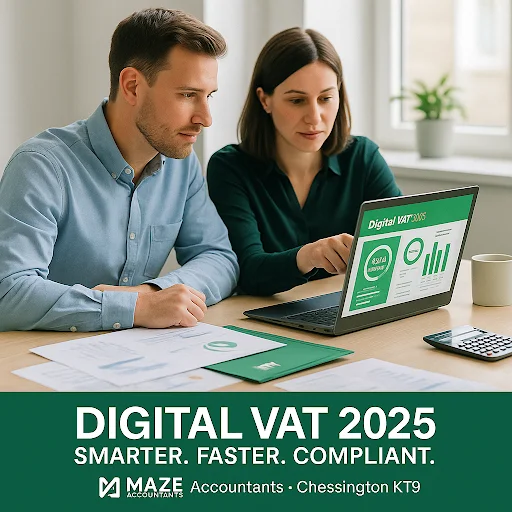The UK tax system is entering a transformative phase, and Digital VAT 2025 is one of the most significant upgrades in the nation’s financial compliance structure. HMRC’s push toward automation means VAT filing, bookkeeping, invoicing, and financial record-keeping must now align with strict digital requirements. For small businesses, sole traders, and limited companies across the UK, early adoption is not optional, it’s essential.
Many businesses are still unaware of how deeply Digital VAT 2025 will affect daily operations. It is not just a tax update; it’s a shift in how businesses maintain financial data, manage invoices, reconcile accounts, and prepare reports. This guide explains everything small businesses need to know including how to stay compliant without overwhelming costs or confusion.
📌 What Exactly Is Digital VAT 2025?
Digital VAT’s 2025 is HMRC’s next phase of the Making Tax Digital (MTD) program. The objective is to ensure:
- Accurate, digitized VAT submissions
- Real-time data visibility for HMRC
- Automated reporting with fewer human errors
- Cloud bookkeeping adoption across all VAT-registered businesses
- Seamless category matching and calculation accuracy
This update eliminates the reliance on spreadsheets or paper-based document storage. To file VAT returns successfully, businesses must use cloud accounting tools such as Xero, QuickBooks, Sage, or similar systems that integrate seamlessly with HMRC’s digital infrastructure.
For expert assistance and a complete transition plan, you can explore VAT Solutions for your business to ensure smooth compliance.
🔍 Who Will Be Most Affected by Digital VAT 2025?
Digital VAT 2025 affects almost every VAT-registered entity, including:
- Small businesses across the UK
- Sole traders providing services
- Limited companies
- Construction workers and CIS subcontractors
- E-commerce sellers
- Retail and hospitality businesses
- Property management entities
- Service-based professionals
If your business is expanding, you may also need help with Limited Company Accounts or Company Formations as part of your compliance journey.
⚠️ What Happens If You Don’t Prepare for Digital VAT 2025?
Ignoring or delaying preparation can result in severe complications, such as:
- Automated rejection of VAT submissions
- Penalties for non-compliance
- VAT refund delays
- HMRC investigations triggered by mismatched data
- Software incompatibility or filing errors
- Increased administrative pressure
Since HMRC is shifting toward data-driven oversight, businesses must ensure their bookkeeping and VAT workflows are aligned with digital standards before the deadline arrives.
📈 How UK Businesses Can Prepare for Digital VAT 2025 (Step-by-Step Guide)
1️⃣ Make the Switch to Cloud Bookkeeping
The first and most crucial step is moving your bookkeeping to a cloud accounting platform. These systems automate transaction categorisation, VAT calculations, and reconciliation.
If you need full setup support, Maze Accountants offers professional Bookkeeping Services designed for small businesses that want to streamline operations.
2️⃣ Keep Financial Records Updated Weekly
Digital VAT relies on real-time accuracy, meaning quarterly updates are no longer enough.
Weekly updates prevent data inconsistencies and reduce submission errors.
Outsourcing your invoice work? See
👉 Outsourced Invoice Processing Services for automated, error-free documentation.
3️⃣ Automate VAT Categories, Rates & Workflows
Using automated tools ensures transactions are placed into the correct VAT code.
This includes automated workflows for:
- Bank feed reconciliation
- VAT rate identification
- Automated invoice numbering
- Receipt matching
- VAT recalculations
For VAT-specific support, refer to Maze’s VAT solutions.
4️⃣ Improve Payroll & CIS Accuracy
Payroll errors can also affect VAT and tax reporting.
If you operate in the construction sector, start learning here:
👉 CIS Payroll – How It Works
5️⃣ Work With a Digital-Ready Accountant
Professional accountants who specialise in cloud systems can help your business maintain compliance long-term.
Maze Accountants supports:
- Startups
- Sole traders
- CIS workers
- VAT-registered companies
- Property businesses
- Service-based SMEs
Explore their full service areas:
👉 Our Service Areas
And for tailored assistance, connect here:
👉 Contact Page
❓ Frequently Asked Questions (FAQ)
1. What software is required for Digital VAT 2025?
You’ll need HMRC-compatible cloud software such as Xero, QuickBooks, Sage, or FreeAgent.
2. Do sole traders need to follow Digital VAT rules?
Yes if you are VAT-registered, Digital VAT 2025 is mandatory.
For support, visit the Self Employment & Sole Trader page.
3. Will spreadsheets still be allowed?
Spreadsheets alone will not be accepted; data must connect digitally with HMRC.
4. Is outsourcing bookkeeping helpful for Digital VAT?
Absolutely. Outsourcing ensures real-time accuracy and reduces compliance pressure.
Start here → Bookkeeping Services
5. What if my business is new?
New businesses must comply from day one. Maze Accountants supports this through
👉 Business Startups
6. Does Digital VAT affect payroll?
Indirectly, yes payroll inaccuracies can affect tax records and trigger audits.
7. When should I start preparing?
Immediately. Early preparation avoids errors, penalties, and last-minute stress.

